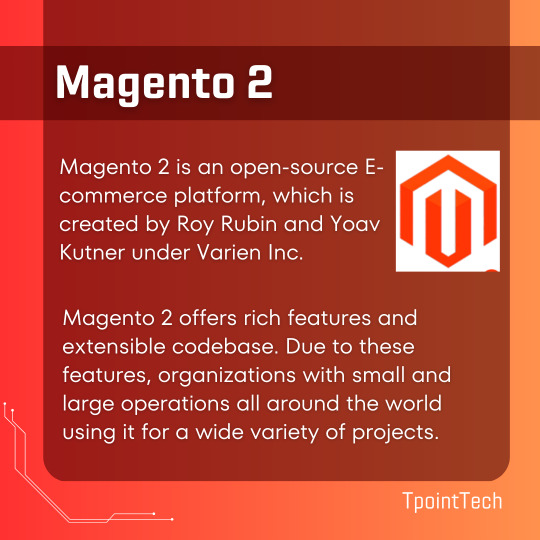#magento tutorial
Explore tagged Tumblr posts
Text

We accept free guest posts about tutorial topics only for designers and developers. You will get the do-follow link if your article is informative. #backlinks #seo #tips #tutorials
#backlinks#seo#tips#tutorials#technology#full stack developer#magento developers#java developers#game developers#web developer
0 notes
Text
Magento 2 Tutorial: Enhancing Your Online Store's Performance and Security

Are you looking to create a robust online store? Look no further! This Magento 2 tutorial is your step-by-step guide to setting up and optimizing your e-commerce website.
Why Choose Magento 2?
Magento 2 is a powerful platform renowned for its flexibility and scalability. Whether you're a small business or a large enterprise, Magento 2 can adapt to your needs, making it a popular choice for online retailers.
Getting Started with Magento 2
Installation:
Begin by downloading Magento 2 from the official website. Follow the installation wizard to set up the platform on your server. Ensure your hosting meets the requirements for smooth operation.
Basic Configuration:
Once installed, configure your store settings. This includes setting your store's name, currency, and language. Navigate through the admin panel to adjust these options easily.
Adding Products:
With your store settings configured, start adding products. Go to the "Catalog" section, and fill in details like product name, price, and descriptions. Upload clear images to attract customers.
Customization:
Magento 2 allows for extensive customization. Choose a theme that matches your brand and customize it using the built-in tools. You can also add extensions to enhance functionality.
Performance Optimization:
Improve your store’s speed and security by enabling caching and setting up SSL. Regularly update Magento and your extensions to keep your store running smoothly.
Ready to Dive Deeper?
For a more detailed guide, check out TAE’s comprehensive Magento 2 Tutorial. Start building your online store today and unlock your business's full potential!
With this tutorial, you're on your way to mastering Magento 2 and creating a successful online presence.
0 notes
Text

Discover how to build and optimize your online store with our comprehensive Magento 2 tutorial. Learn installation, customization, performance enhancement, and security tips to launch a successful e-commerce business.
0 notes
Video
youtube
Magento Tutorial For Beginners, Full Course (2024)
Have you ever thought about learning Magento development, or becoming an M2 programmer? Here's a quick course, or rather, a "Jumpstart", to get your feet wet with Magento code.
#youtube#magento tutorial for beginners#Magento Tutorial For Beginners full course#magento#Magento Coding For Beginners
0 notes
Text
Best SEO Services for Doctors - Coregenic Software
Best SEO Services for Doctors: SEO, or search engine optimization, has grown to be a crucial component of any company’s online marketing plan, including medical practices.

People use search engines to find solutions to their health-related questions in the modern digital era.
Search engine optimization (SEO) services are specially designed for healthcare professionals, such as doctors, dentists, and other medical practitioners, to enable them to assist their websites in ranking higher in search engine results pages (SERPs) for key terms and phrases that potential patients may type in when looking for medical services online.
#seo#Best SEO Services for Doctors#SEO Services for Doctors#seo services#seo for doctors#marketing for doctors#seo for beginners#medical marketing for doctors#seo tutorial for beginners#digital marketing for doctors#best seo services#local seo services#top seo services#seo for local business#low cost seo services#best seo services company#magento seo services#doctors
0 notes
Text
A Comprehensive Guide to Getting Started with Hyva Magento
Is your Magento 2 experience ready for an upgrade? This comprehensive tutorial helps you take advantage of Hyva Magento's speed and ease of use to create a beautiful e-commerce website by guiding you through the installation, setup, and best practices of the platform.

#saas platform development#shopify developer#saas development services#saas development#hyva magento#hyva theme development#hyvä theme development#shopify web developer
0 notes
Text
Les Clés du Marketing Digital en 2025 pour Booster Votre Business
Cette vidéo vous dévoile les meilleures stratégies pour how to change tax rates in magento | tutorial – astuces et stratégies pour réussir en ligne !. À ne pas manquer ! Description détaillée de Les Clés du Marketing Digital en 2025 pour Booster Votre Business Ne manquez pas les tendances marketing digital de 2025 ! Personnalisation, intelligence artificielle et nouvelles stratégies de contenu,…

View On WordPress
0 notes
Text
Going from Physical Offices to Online Business: Step by step Guide for Businesses

Is your business still operating solely offline? Are you wondering how to expand your reach and take your operations online?
In today’s digital era, having an online presence is no longer optional—it’s essential for growth, increased sales and staying competitive. Moving your business online requires careful planning, execution, and adaptability. This guide outlines the key steps, challenges, and precautions to help you successfully transition to the digital world.
Steps to Take Your Business Online
1. Define Your Online Business Goals
Start by identifying why you want to transition online. Is it to boost sales, enhance brand visibility or improve customer service? Having clear goals will help shape your digital strategy effectively.
2. Choose the Right Online Platform
Select the best platform based on your business needs:
Website: Acts as your digital storefront and brand identity.
E-commerce Store: Platforms like Shopify, WooCommerce, and Magento allow seamless online selling.
Social Media: Facebook, Instagram, and LinkedIn help with engagement and brand promotion.
Consulting a marketing agency can help you choose the most effective channels for your business.
3. Set Up Your Website or Online Store
Register a domain name that reflects your brand.
Choose a reliable hosting provider.
Build your site using website builders like WordPress or Shopify or hire a developer.
Ensure your site is mobile-friendly, fast and easy to navigate.
4. Develop a Strong Digital Marketing Strategy
Once your site is live, focus on attracting customers through:
Search Engine Optimization (SEO): Improve search rankings for better visibility.
Content Marketing: Create blogs, videos and infographics to engage your audience.
Social Media Marketing: Build a loyal community and drive sales.
Email Marketing: Keep customers informed and engaged.
Paid Advertising: Use Google and social media ads for targeted reach.
5. Implement Secure Payment and Logistics Solutions
Offer multiple payment options (credit/debit cards, PayPal, etc.).
Partner with trusted shipping and fulfillment services.
Provide clear return and refund policies to build customer trust.
6. Build Strong Customer Support
Use chatbots, email, and phone support to assist customers.
Provide self-help resources like FAQs and tutorials.
Respond promptly to inquiries and complaints to maintain customer satisfaction.
7. Monitor and Improve Your Online Business
Use analytics tools like Google Analytics and Facebook Insights to track performance.
Collect customer feedback and make necessary improvements.
Stay updated with digital trends and continuously adapt your strategies.
If managing this transition feels overwhelming, consider working with a marketing partner like Katalysts, to help guide your business through the process.
Precautions to Take When Moving Online
1. Ensure Cybersecurity for Safe Transactions
Secure your website with an SSL certificate.
Protect customer data with encryption and secure payment gateways.
Train employees to recognize online security threats like phishing and malware.
2. Comply with Legal and Regulatory Requirements
Ensure your business follows online business regulations.
Have clear privacy policies, terms of service, and refund policies.
Comply with tax laws related to online sales.
3. Avoid Overinvestment at the Start
Launch with a minimum viable product (MVP) before scaling up.
Test the market with a small product range before expanding.
Focus on organic growth before investing heavily in ads.
Challenges and How to Overcome Them
1. Competition from Established Online Businesses
Solution: Identify your Unique Selling Proposition (USP), build a niche, and provide superior customer service.
2. Gaining Online Visibility
Solution: Invest in SEO, content marketing, and social media engagement. Collaborate with influencers and implement referral programs.
3. Building Customer Trust and Retention
Solution: Display customer reviews, maintain transparent policies and offer excellent customer support.
4. Managing Logistics and Deliveries
Solution: If you’re running an e- commerce business, partner with reliable shipping companies, use inventory management software and set clear delivery expectations.
5. Adapting to New Technologies
Solution: Stay updated with the latest trends, invest in staff training and remain flexible in adopting new innovations.
The future of business is digital—embrace it today!
Shifting from offline to online business can unlock tremendous opportunities for growth. With the right strategies and a step-by-step approach, you can establish a strong digital presence. Start small, stay consistent, and refine your approach based on customer feedback and market trends. Consult Katalysts.net to help you create a website, create a shop on an e-commerce platform and create social media channels (Instagram, Facebook, LinkedIn, Youtube, Tiktok) for showcasing your products and services.
0 notes
Text
Top CMS Platforms for Your Website Development in 2025
When it comes to developing and managing websites, choosing the right Content Management System (CMS) is essential for creating seamless user experiences. The CMS platform you select will dictate how efficiently you can manage content, integrate with other systems, and provide a satisfying digital experience for your visitors. In this post, we’ll dive into the most popular and powerful CMS options available today, each offering unique features suited to different business needs.

Key Takeaways:
Insightful overview of the best CMS platforms for web development.
Benefits, features, and drawbacks of top CMS systems.
Tips on choosing the most appropriate CMS solution for your business.
1. WordPress: The Unmatched Leader
WordPress remains the most popular CMS worldwide, powering more than 60% of all websites. It’s known for its ease of use, flexibility, and extensive plugin ecosystem. Originally designed for blogging, WordPress now supports a variety of websites, from personal blogs to enterprise-level portals.
Key Features:
Highly Customizable: With thousands of plugins and themes, WordPress can be tailored to fit almost any business model.
SEO-Friendly: Built-in features and additional plugins enhance SEO capabilities, helping websites rank higher on search engines.
User-Friendly: No coding experience required for basic use, making it ideal for beginners.
Extensive Support: A massive community, forums, tutorials, and experts available for assistance.
Pros:
Free and open-source
Highly scalable for growing businesses
Large library of themes and plugins
Cons:
Security can be a concern with poor maintenance
Performance may slow down with numerous plugins
Best for: Small businesses, blogs, and large enterprises looking for an easy-to-manage website with extensive functionality.
2. Magento: Powering E-commerce Websites
For businesses focused on online stores, Magento is a powerhouse CMS. Built specifically for e-commerce, it offers robust features that make managing large-scale online shops easier.
Key Features:
E-commerce Focused: Magento excels in handling complex product catalogs and managing large inventory.
Scalability: Suitable for businesses of all sizes, from small shops to enterprise-level e-commerce platforms.
Advanced SEO and Marketing Tools: Built-in tools that help improve search rankings and provide customer-targeted marketing solutions.
Flexibility: Highly customizable for developers to create a unique shopping experience.
Pros:
Ideal for large-scale e-commerce sites
Great for handling high traffic and complex inventories
No upfront software costs
Cons:
Requires technical expertise for setup and maintenance
Can be resource-intensive, requiring robust hosting
Best for: Medium to large e-commerce businesses looking for a scalable and feature-rich platform.
3. Drupal: Powerful and Flexible for Developers
Drupal is a CMS favored by developers for its flexibility and customization options. It offers a robust framework that allows users to create highly complex websites, such as community-driven sites or enterprise-level platforms.
Key Features:
Extensive Customization: Drupal’s API allows for high flexibility in development, providing developers full control over site functionality.
Advanced Security: Known for its strong security features, it’s a preferred choice for government and large corporations.
Multilingual Support: Drupal supports multi-language websites, making it an ideal choice for global businesses.
Content-Authoring Tools: Excellent for large teams with multiple content creators, offering a collaborative authoring environment.
Pros:
Very secure and customizable
Ideal for complex websites
Multilingual capabilities
Cons:
Requires higher technical knowledge
Can be overwhelming for beginners
Best for: Large businesses, government organizations, and developers looking for flexibility and security.
4. Joomla: Balanced for Both Beginners and Developers
Joomla is often considered a middle ground between WordPress and Drupal. It offers powerful features and a relatively easy setup process, making it suitable for both beginners and developers.
Key Features:
Multilingual Support: Joomla comes with built-in multilingual support, which makes it ideal for international businesses.
User Management: Provides advanced user management options, making it a great option for community-based websites.
Extensibility: Thousands of extensions and templates available for customization.
Flexible Content Management: Excellent for managing a range of content types and building complex structures.
Pros:
Good for e-commerce and social networking
Easier to use than Drupal but more flexible than WordPress
Solid documentation and support community
Cons:
Limited number of templates and extensions compared to WordPress
Steeper learning curve than WordPress
Best for: Medium-sized businesses that need flexibility and more control than WordPress offers.
5. Umbraco: A .NET-based CMS for Security and Flexibility
Umbraco is a .NET-based open-source CMS that offers both ease of use and high-level customization for developers. It is ideal for businesses that require secure, scalable solutions.
Key Features:
Built on .NET: Its foundation on Microsoft’s .NET framework makes it secure and highly stable.
Highly Customizable: Umbraco offers advanced content management capabilities and can be extended with custom features.
Security-Focused: Umbraco benefits from the security of the .NET environment, making it less susceptible to malware.
Pros:
Excellent security features
Ideal for enterprise-level websites
Great support for large-scale projects
Cons:
Requires developer expertise for setup and maintenance
Not as widely used as WordPress or Drupal
Best for: Businesses looking for a secure, scalable solution and developers familiar with .NET.
6. HubSpot CMS: Perfect for Marketing-Centric Websites
HubSpot CMS is a comprehensive platform designed for marketers. It allows businesses to create websites that are seamlessly integrated with marketing tools like email marketing, SEO optimization, and lead generation.
Key Features:
Built-in Marketing Tools: Includes features for lead tracking, email marketing, and social media management.
SEO Features: HubSpot’s CMS has built-in SEO tools that help optimize website content for search engines.
Easy-to-Use Interface: Provides drag-and-drop features for content management, making it ideal for marketers.
Pros:
All-in-one solution for marketing and content management
Excellent for lead generation and CRM integration
User-friendly for non-technical users
Cons:
Not as flexible as other CMS for complex websites
Pricing can be steep for small businesses
Best for: Small businesses focused on inbound marketing and lead generation
7. Shopify: Best for Quick and Easy E-commerce Websites
Shopify is one of the most popular platforms for building online stores. It offers an intuitive interface, making it an excellent choice for entrepreneurs who want to quickly set up and manage an e-commerce website.
Key Features:
E-commerce Focused: Tailored to selling products online with integrated payment processing, inventory management, and shipping tools.
App Marketplace: Over 600 apps available to extend functionality.
Mobile-Ready: Optimized for mobile shopping experiences.
Pros:
Easy to use and set up
Excellent customer support
Great for small to medium-sized e-commerce stores
Cons:
Transaction fees unless using Shopify Payments
Limited flexibility compared to Magento for large stores
Best for: Entrepreneurs and small businesses looking to launch an online store with minimal hassle.
Wrapping Up: Choosing the Right CMS for Your Website
The CMS platform you select plays a pivotal role in how efficiently your website is developed, managed, and scaled. Each CMS has its strengths, depending on your business type and specific needs. Whether you’re creating a blog, an online store, or an enterprise portal, there's a solution tailored to your goals.
For more tailored advice on the best CMS for your project, reach out to Codfty. We specialize in creating custom CMS-based websites that align with your business needs and ensure long-term success.
Ready to start your CMS journey? Schedule a consultation with Codfty today!
0 notes
Text
WordPress – Is It Worth Investing For Your Ecommerce Business?
WordPress has become a popular choice for businesses worldwide. Many use it to build websites, including ecommerce stores. But is it worth your investment? Let’s explore this topic in detail.

What is WordPress?
WordPress is a platform for building websites. It is open-source and easy to use. Businesses of all sizes use WordPress. It powers over 40% of all websites globally. You can build blogs, portfolios, and online stores with WordPress. It is flexible and highly customizable. The platform supports plugins to enhance its functionality.
Why Consider WordPress for Ecommerce?
WordPress is not just for blogs. WooCommerce Help supports ecommerce solutions. Plugins like WooCommerce transform WordPress into an online store. WooCommerce is free and offers premium features. You can sell physical and digital products. It also supports subscriptions and memberships.
Advantages of Using WordPress for Ecommerce
1. Cost-Effectiveness
WordPress is free to download. You only pay for hosting and domain names. Custom plugins and themes may require extra costs. Compared to custom-built platforms, WordPress is affordable. Even small businesses can afford it.
2. Flexibility and Customization
WordPress offers endless customization options. You can choose from thousands of themes and plugins. Themes control your WordPress Website Design. Plugins add features like payment gateways and SEO tools.
3. SEO-Friendly Features
WordPress makes search engine optimization (SEO) easier. It has WordPress SEO plugins like Yoast SEO and Rank Math. These tools help optimize your website for search engines. They guide you to improve keywords, meta tags, and readability.
4. Scalability for Growth
WordPress grows with your business. You can start small and expand later. Adding products, pages, and features is easy. Even with growth, WordPress remains efficient.
5. User-Friendly Interface
You don’t need coding skills to use WordPress. Its interface is intuitive and easy to learn. Even beginners can manage their websites. Tutorials and online forums offer extra WordPress support.
Challenges of Using WordPress for Ecommerce
1. Regular Maintenance
WordPress requires frequent updates. Themes, plugins, and the core platform need to stay updated. Neglecting updates can make your site vulnerable to security risks.
2. Security Concerns
WordPress is a popular target for hackers. Using outdated plugins or themes increases risks. However, using reliable plugins and secure hosting can reduce these risks.
3. Dependency on Plugins
WordPress relies heavily on plugins for ecommerce functionality. Poorly coded plugins can slow down your site. You must choose trusted plugins for better performance and security.
How WordPress Compares to Other Platforms?
Shopify
Shopify is a dedicated ecommerce platform. It is easier to use than WordPress for online stores. However, Shopify can be more expensive. WordPress offers more flexibility at a lower cost.
Wix
Wix is beginner-friendly but less flexible than WordPress. Its ecommerce features are limited compared to WooCommerce.
Magento
Magento is powerful but requires technical knowledge. WordPress is easier for non-developers.
Is WordPress Worth the Investment?
For many businesses, WordPress is a great choice. It is cost-effective, flexible, and scalable. However, it may not suit everyone. If you need a ready-made solution, Shopify or Wix could be better.
Conclusion
WordPress is worth considering for your ecommerce business. Its affordability, customization, and SEO tools are unmatched. Evaluate your business needs before choosing a platform. WordPress may be the key to your ecommerce success.
1 note
·
View note
Text
Worried about Magento security for your ecommerce website? Magento security extensions can help you to host a secure ecommerce server easily. Extensions can conveniently enhance magento security features. It is important to have Magento security extension for your computer since it is an IP security that restricts the access to certain websites by IP masks or address. Once the restriction is triggered the viewer of the page gets redirected to the CMS page that is specified in the settings or a blank page. We dozens of hacking software on internet any website is not secure. Making sure a ecommerce store is secure is utmost important for website owners. This article describes 14 such addons that offer Magento security extension and also description about the same. This article will work as a one-stop-shop to know about the extension and make decision of getting the one that suits your need. You may also want to checkout magento tutorials. MageFirewall Security This is a security plugin that ensures the security of typical web attacks as well as address the security issues that are Magento specific. This is a free security plugin available online and it enables to create an extra security layer around the Magento commerce system. Spam Killer This Magento extension helps in preventing spams on contact form and product review by using Akismet web services. This service checks if it is a spam or not. If the message is not a spam it offers the capability to moderate the message by the user at the Magento backend. ET IP Security This is a free extension that allows restricting the chosen websites by IP or IP masks. During the triggering action of the restrict rule the page viewer will get redirected to the CMS page or a blank page. It sends an email notification about the triggered rules. Captcha Plus The Captcha Plus is built by Magento for Create User, Login, Forgot Password, Checkout Guest and Register during the checkout process. It is possible that spam can come from the Product Review and Contact Us forms as well. The Captcha Plus extention enables adding a Captcha to both the forms. Contact Us Captcha This extension is useful in order to add a Captcha to the default Magento contact us form. This extension is useful in preventing spams. It is a very useful extension that helps in preventing spams in the forms and website offers useful tips and installation guide. Restrict By Customer Group This is a very useful extension that hides or restricts the areas of the websites from various groups of customer like retailers, wholesalers, registered, logged-in etc. This extension has the capability to hide a web page, static block and product category. It allows website to redirected to other external or internal web pages. Geo-IP Default Store This is a switcher extention that redirects the website visitors to a pre-determined store groups automatically. The pre-determined store groups are to be defined by the admin during the setup. This extention also enables to create a store view targeting the Asian viewers means it serves the Asian content. Geo-IP Ultimate Link This extention allows the users to secure the website against the unwanted traffic from any locations. It monitors real-time traffic and restricts or blocks any IP address instantly. It also blocks the IP modules using Magento Catalog. It allows selected product attributes like price, SKU etc. Extension IP Security This IP security has the capability to restrict the access to the websites by IP address and masks. This security also redirects viewers to CMS page or a blank page. It sends email notifications while triggering the restriction rules. This also offers opportunity to switch off website for maintenance. Two-Factor Authentication This is a very useful extension and it protects the store from threats like key loggers, unprotected Wi-Fi connections, connection sniffing etc. This is basically a threat protecting extention and protects the store from the various threats that uses Google authenticator and the smart phones to authenticate the admin session.
Enhanced Admin Security: Two-Factor Authentication Do you want to protect your Magento backend from unauthorized logins and fraudsters? If you wish so then this extension is the best choice. This is a two-factor authentication Magento security extension that offers an extra layer of security to your IP address, mask and TCP. Improved Admin Security 2.0 This extension is the best possible option to save your stored data from hacker attack and unauthorized logins. This is a two-factor authentication system that is one of the best suited Magento security for all your stored data. The Magento security is based on Google Authenticator application. Magento This extension has loads of Magento security features that are flexible and scalable support growth. It contains powerful tools meant for marketing and is SEO optimized. It has a global partner network and the certified developers are always available to help you implementing the solution. Bot Blocker This extension is a useful one in blocking spam and other bad bots that has a significant effect in the storage capacity and increases the load on the server. Detecting hacked websites is easier with this extension and enables high speed to the server and reducing Magento vulnerability Now that you have quite a few options for securing Magento, the choice is yours as per your requirement. It depends on how you want the Magento security to work for you and the security level required for your IP address.
0 notes
Text
Looking to boost your WordPress website's speed and performance in 2025? Check out our latest blog, where we share expert tips and strategies for optimizing your site for faster load times, better user experience, and higher search engine rankings. Whether you're a beginner or an experienced website owner, these actionable insights will help you enhance your WordPress website development and stay ahead of the competition. Don’t miss out—optimize your site now and watch your performance soar!
#web development company#wordpress development company#wordpress website development company#wordpress#digital marketing and web development company#ecommerce development services
0 notes
Text
How to Switch to Hyva Magento for Better Results
Switching to Hyva Magento gives your store a front-end that is easier to use and more efficient. This tutorial covers installation, configuration, and the advantages of better SEO and faster page rendering when you switch your Magento store to Hyva Magento.

#saas platform development#shopify developer#saas development#saas development services#Hyva Magento#Data migration magento 1 to 2#Magento 1 to magento 2 migration
0 notes
Text

Magento 2 . . . . for more information and tutorial https://bit.ly/41ordBf check the above link
0 notes
Text
Top PHP Development Services: Transforming Ideas into Robust Websites
In today’s dynamic digital world, PHP development services stand as the backbone for creating robust, feature-rich, and user-friendly websites. PHP, a widely-used open-source scripting language, has empowered developers worldwide to craft scalable and dynamic web applications. Businesses, large and small, rely on professional PHP development services to transform their ideas into fully functional websites tailored to their specific needs. This article delves into the intricacies of PHP development services, highlighting their importance, core offerings, and why they are essential for any modern business aiming to establish a solid online presence.
What Are PHP Development Services?
PHP development services encompass a range of solutions designed to build, maintain, and optimize websites and web applications using PHP. These services include custom web development, CMS integration, eCommerce solutions, API development, and more. Leveraging PHP allows developers to build dynamic and responsive websites that seamlessly integrate with other technologies, databases, and third-party services.
Key Advantages of PHP Development
1. Open Source and Cost-Effective
PHP is free to use, making it a cost-effective solution for businesses. Its open-source nature enables developers to access a vast community of contributors, ensuring continuous updates, new features, and robust security patches.
2. Cross-Platform Compatibility
PHP supports multiple platforms, including Windows, Linux, and macOS. This compatibility ensures that applications built with PHP function efficiently across diverse environments.
3. High Scalability
Whether you’re a startup or an enterprise, PHP offers unparalleled scalability. Websites and applications developed using PHP can handle increasing traffic loads without compromising performance.
4. Seamless Integration with Databases
PHP supports integration with various databases, including MySQL, PostgreSQL, Oracle, and SQLite. This flexibility makes it ideal for building data-driven applications.
5. Speed and Performance
PHP optimizes server-side processing and reduces page load times, contributing to faster-performing web applications.
Core PHP Development Services
1. Custom PHP Web Development
Custom PHP development services cater to unique business requirements by building tailored solutions. These services ensure that every feature and functionality aligns perfectly with your business goals, offering a personalized user experience.
2. PHP-Based CMS Development
Content management systems (CMS) like WordPress, Drupal, and Joomla are built on PHP. Professional PHP developers can customize these platforms to suit your needs, enabling you to manage your website’s content effortlessly.
3. eCommerce Solutions
PHP powers some of the most popular eCommerce platforms, including Magento, OpenCart, and PrestaShop. With PHP, businesses can develop secure, scalable, and feature-rich online stores that provide exceptional user experiences.
4. API Development and Integration
Modern web applications often require interaction with third-party services. PHP developers excel at creating APIs and integrating them into existing systems, ensuring seamless functionality and interoperability.
5. PHP Maintenance and Support
Ongoing maintenance is critical for website performance and security. PHP development services include regular updates, bug fixes, and performance optimization to ensure your application remains at its best.
Why Choose PHP for Your Web Development Needs?
1. Extensive Community Support
PHP boasts a massive developer community that offers resources, tutorials, and forums to assist in solving development challenges. This support ensures that PHP-based projects are always up-to-date and secure.
2. Rich Framework Ecosystem
Frameworks like Laravel, Symfony, CodeIgniter, and CakePHP simplify development by providing pre-built modules and tools. These frameworks enhance productivity and ensure adherence to best practices.
3. Proven Track Record
PHP has powered some of the most successful websites globally, including Facebook, Wikipedia, and WordPress. Its reliability and versatility make it a trusted choice for developers and businesses alike.
4. Enhanced Security
With the proper implementation of coding standards and security practices, PHP ensures that your application is safe from common vulnerabilities like SQL injection, XSS, and CSRF attacks.
The PHP Development Process: From Concept to Launch
1. Requirement Analysis
A comprehensive analysis of your business needs is the first step. PHP development experts assess your goals, target audience, and desired features.
2. Planning and Design
The next phase involves creating wireframes and prototypes. Developers and designers collaborate to build a visually appealing and functional user interface.
3. Development
Using PHP and its frameworks, developers code the website or application, ensuring it meets performance and scalability standards.
4. Testing
Rigorous testing is conducted to identify and resolve bugs. This phase ensures the application runs smoothly across all devices and browsers.
5. Deployment and Maintenance
After launch, ongoing maintenance and updates ensure the website remains secure, functional, and aligned with business growth.
Industries That Benefit from PHP Development Services
PHP development services cater to various industries, including:
E-Commerce: Secure and scalable online stores with seamless payment integration.
Healthcare: HIPAA-compliant web applications for managing patient records.
Education: E-learning platforms with interactive features.
Finance: Secure web applications for banking and investment management.
Travel and Hospitality: Dynamic websites with booking and payment features.
Choosing the Right PHP Development Partner
Selecting a reliable PHP development company is crucial for the success of your project. Look for a team with:
Proven expertise in PHP and related technologies.
A strong portfolio showcasing diverse projects.
Positive client testimonials and reviews.
Transparent communication and project management practices.
Conclusion
Investing in top-notch PHP development services is essential for businesses aiming to establish a competitive edge in the digital space. With its versatility, scalability, and cost-effectiveness, PHP continues to be the go-to choice for web development. Whether you need a custom web application, an eCommerce platform, or a CMS-powered website, PHP development services can turn your vision into reality.
#PHP development services#PHP website developer#PHP development company India#Php development services
0 notes
Text
Why Should You Make Your Own Magento Website?
There are several benefits for companies looking for a customized online presence when they build their own Magento website. Building a custom website gives you total control over the user experience, functionality, and design, ensuring that it perfectly reflects your business. Flexible product management, SEO capabilities, and scalable architecture are just a few of Magento's strong features that enable you to build an eCommerce platform that can expand with your company. Creating your own website also enables customized customer service and original marketing approaches. In a competitive market, spending time developing a Magento website might ultimately result in more client satisfaction and more sales potential.
Setting Up Your Magento Store: A Detailed Guide Using a robust platform like Magento necessitates meticulous preparation in order to build a successful online store. Everything from choosing a Magento webshop expert to comprehending Magento webshop expenses will be covered in this tutorial. The Value of magento webshop hosting Making the correct hosting choice is essential when starting to create a Magento online store. Hosting companies for magento webwinkel need to be able to manage the demands of an eCommerce platform so that your website functions properly even during periods of high traffic. Selecting a Magento-focused hosting company will improve the security and performance of your website, improving user experience.

Employing an Expert in Magento Webshop By working by an experienced magento webshop specialist, you may have a Magento webshop that is custom-made to your needs. A professional can help you through every step of the development procedure, from the first design to the final implementation. They can assist you in comprehending the kosten magento 2 webshop, which can differ according to features and intricacy. Purchasing a qualified expert could lead to a website that is more effective and efficient. Knowing the Price of Magento Webshop Design, functionality, and upkeep are just a few of the factors that must be taken into account when calculating the magento webshop prijs. Although the price of a Magento 2 webshop may seem exorbitant, it frequently reflects the platform's excellence and scalability. In the long run, a magento webshop bouwen may be more valuable than a plain template, particularly as your company expands.
rsonalizing Your Magento Website
Making your online store unique is one of the biggest benefits of utilizing Magento. By adding features that are specific to your consumers' demands, you can webshop bouwen magento that complements your brand identity. You have almost infinite customization choices whether you decide to magento webshop ontwikkelen from the ground up or hire experts to create a Magento 2 website.
The choice to use Magento to create a webshop or to have a Magento website constructed ultimately comes down to your financial constraints and company objectives. Purchasing a high-quality platform can boost sales and customer happiness, even though the magento webshop kosten can vary. You may build a strong online store that stands out in the crowded eCommerce market by working with a Magento webshop expert and picking your hosting provider wisely. Your Magento webstore might be a great asset to your company with the correct strategy, propelling expansion and prosperity for many years to come.
0 notes